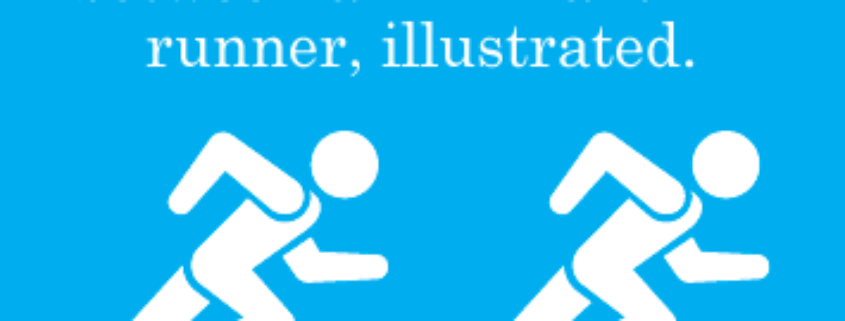How Roland Barthes Changed My Life
My original piece for this was titled “What It Means to Be Human Today,” but since I was introducing a new paradigm of human man, the post was perhaps ambitious in aim. So I withdrew it. Since I am a waterproof hybrid human being made in part of walrus skin [not], my annoyance with my own misfire rolled right off and theoretically wetted the bellybutton lint and dried port stains under my writing desk.
So why am I still talking about that original post? Because of Roland Barthes.
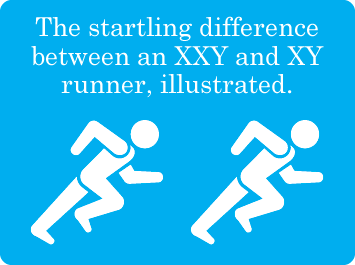
Hint: there is no difference between XY and XXY.
The point was to illuminate that in my wealth of experience with this, people do not accept the reality of a different healthy human DNA paradigm than the one we are taught in K-12 school, and to illustrate why that is, why it is a human problem, and to share a simple way to take my background and apply it in a productive way to your own differences. I gathered from the feedback, a heavy read on Western medicine’s human difference extermination agenda and Google’s lack of accountability was a bit much to digest.
The gist was, the assumed human chromosome archetypes in Western medicine are XX women and XY men. I am an XXY man, which is not a combination of XX and XY, but a male iteration all its own.
XXY is not intersex, but being that it’s different, people generally don’t accept it at face value. Instead, they squirm. That’s probably because the idea that a human might have two sex parts or inclinations—which is not what XXY is—threatens masculinity and gender roles. If men had both a penis and a vagina, what they have done to women personally and societally could also be done to them. They’d be screwed, literally and figuratively. Of course, it’s not that simple.
All you really need to digest is, XXY is the newer, more sensitive, fully capable man. Got that reality? Great, now you can ignore the false facts and misinformation Western medicine preaches (and Google regurgitates) to keep their annual research funding intact instead of doing right by humanity, and you can skip all the hard facts (such as the 280,000 annual terminations of healthy XXY fetuses based on doctor recommendation—not a pro-life argument, but a pro-human statement; or the fact that XXY does not equal Klinefelter syndrome, in spite of what Google and NICHD’s Genetics Home Reference state).
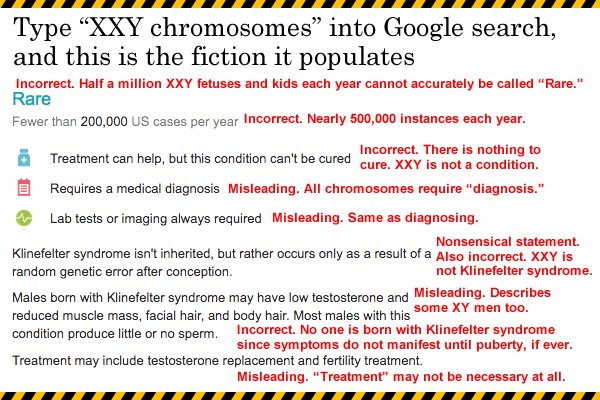
False “facts” Google promotes.
On the other hand, if you want to know what the hell I’m talking about, and help me rip the chastity belt off supposed human archetypes, get in touch, especially if you are an agent, because I’ve written a well-reviewed book on the subject, will market it with all the re-appropriated energy of my left nut, and I’d love to be your client. That’s not an ad for me—people need to know the truth.
Then there is Roland Barthes. He knew what was going on.
I had not read Roland Barthes until hours prior to writing this piece. Yet, in the lengthiest of totally roundabout ways, I would never have found his writing if not for my XXY chromosomes. I fucking love XXY chromosomes!
My path to Roland Barthes began in my lower right bicuspid, at the office of my Seattle dentist of eight years. He messed up a root canal, drilling through the tooth root, and pushing the infected nerve through the hole, leaving it on my jaw to writhe in its misery and plot my demise.
The infection spread up my jaw to the trigeminal nerve, a large cluster of nerves just in front of your temple. The trigeminal nerve runs around your eye and ear, then threads inside your skull, where it wraps around one hemisphere of your brain.
It was soon apparent, my nerve intended to kill me.
My dentist left me for dead, refusing to see me to address the problem. I had to fend for myself for five weeks, during which I survived roughly four hundred and twenty prolonged six-minute brain shock treatments (forty-two hours worth), courtesy of my infected trigeminal nerve.
Some people would have smoked a corresponding four hundred and twenty bowls of pot, but being the son of a dead international drug smuggler, I have always preferred to not partake.
I went to my doctor instead, but as brilliant as the man is, he couldn’t figure out how to stop my nerve’s audacious nerve. He dutifully handed me a whopping bottle of Percocet, which I proceeded to hate as it caused my eyesight to go blurry, yet did nothing to dull the pain. He said, “You might have taurodontism because of your XXY chromosomes; that could be the cause of everything.”
He was not right. Taurodontism is when the roots of teeth are expanded and curl under, causing a weak root structure.
My teeth are the opposite, with abnormally long, strong roots, so when a tooth dies, I feel the pain more intensely further up into the soft tissues.
That one incorrect comment, the thought that my chromosomes could be the cause of my pain ignited my social justice mind and my writing.
I want to share with you just how inhumanly painful it is to have your brain shocked for six minutes straight by your trigeminal nerve. It is FUCKING painful (if you know what a point size is [it’s a typography term], increase the word FUCKING by about 97,477 points). The only fair comparison to equate the magnitude of it is pouring ethanol on your scalp and lighting it on fire, while having a ripped bodybuilder squeeze your head in their hands with all the strength they can muster. Oh, and jamming a live wire through your eardrum.
After five weeks, my former dentist sent me to a renowned oral surgeon who said, “People die from this. You are lucky to be alive.” He performed an incredibly painful micro-surgery, sticking hook-nosed forceps down my tooth socket, and placing medicated gauze directly against the nerve on my jaw, which stimulated the nerve to heal itself. He couldn’t numb me up for it because he had to see me wince when he contacted the nerve.
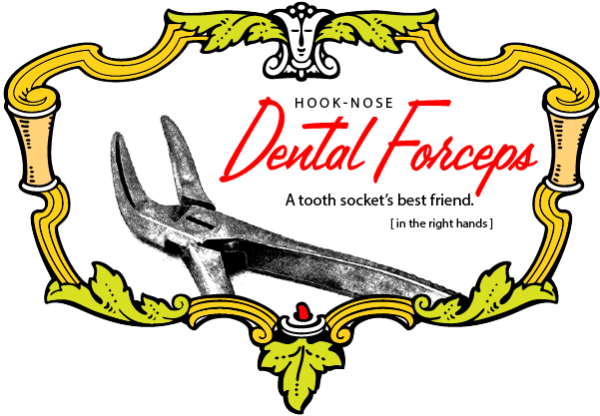
An oral surgeon saved my life with these.
I don’t know how or why I survived, but it is surely in part because of my XXY chromosomes, and to share my stories.
I am one stubborn fucker. I really am. When it is my time, I will climb a mountain if I have to crawl the whole way on my knuckles and knees through a whiteout blizzard. I will see the world fade on my own terms. There was no way I was going to croak from a goddamned root canal, and though I cried humble tears and begged to feel the grim reaper’s scythe pierce the skin of my nape to escape the pain, once I had fought those terrible, wretched nerve shocks for a few weeks, I dreamed deep down that I could beat them. It’s why I kept fighting.
Being stubborn is part of being XXY. If you know when to give in, stubbornness can be a good thing.
The micro-surgeries—there were two—were successful, and one week later, I had survived. Nine years on, I know it was the greatest of all my victories.
There were no long-term negative repercussions. Except the complete dismantling and re-informing of my life.
I had forgotten much of my childhood, but somehow the nerve shocks brought the memories back into my consciousness, and it changed how I related to the world.
The abandonment I experienced during the nerve infection from friends, family, medical professionals, and the financial sector, also changed my relationship to society. I learned that the pillars of our life are a sham, a frolicking fraud, salivating to suck the last dollars out of you before you fall down, a mere bloodless corpse.
Family and friends returned when I was healthy again. The overwhelming positive was, I began writing in recovery, and I never stopped. Before that, I had written one novel, cast it aside, and rarely wrote anything but one of the thousand or so songs I have penned.
I’m not one to rest on accomplishments. After surviving, I had to figure out how to be alive again, and that led me to Antioch University Seattle, where I gained a new awareness of what it means to be human. It’s also where I began writing several books, including the one about my chromosomes.
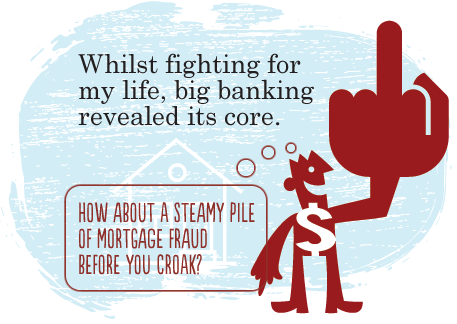
Creditors attacked when they discovered the nerve issue.
I learned about diversity, intercultural communication, racism, poverty, and writing. I learned I am a natural born writer. My love of reading books was reignited. I discovered how my XXY chromosomes heavily influence how I learn. I wrote four books.
Next, I was accepted into Antioch University Los Angeles’ top-ranked MFA in Creative Writing program. Yet, I still had only a slight awareness of this character named Roland Barthes.
During my MFA, I rewrote the XXY book, wrote a novel about surviving and learning how to be alive again (go figure), wrote much of a collection of short stories, and penned most of a third novel, which I am currently completing.
Oh my God—we’re here! Enter Roland Barthes.
Oh, wait. First, I gotta’ tell you, I fucking hate the French—kidding! I love the Cole Porter song “I Love Paris!” when performed by Les Negresses Vertes. I love riding my bike in southern France. I enjoyed Jacques Derrida’s concept of “The Other.” As a hopeless romantic, Jean-Pierre Jeunet’s films are among my favorites. People being people, I probably would love the French and their deliciously gawdawful attitude if I could cobble my four years of high school French—which provided me perhaps a grade deux level—into effectively communicating in France.
Anyway, Roland Barthes.
How I came to know Roland Barthes’ The Pleasure of the Text was, I wanted to see the whole of America’s K-12 education system leveled and redesigned (forgive my idealism), so that every child and adult learner truly has equal opportunity at an excellent education, without cultural bias, racism, without human difference or financial exclusion, and without learning differences remanding intelligent minds to remedial classes.
I was an A-student in middle and high school, yet today’s standards say XXY boys and men will possess subnormal intelligence. Sadly, parents believe what doctors preach about XXY, even though most doctors do not understand the difference. It leaves XXY kids not connecting with the teaching because they’ve been taught they are not intelligent, when the truth is, they may be abnormally intelligent and bored.
When I gained an awareness of how I learn, I wanted to help people who have experienced difficulty in school born of their own learning differences. I wanted to help them forge connections, and to tell their stories. Because our thoughts and stories are all we truly own.
I applied to the Post-MFA Certificate in the Teaching of Creative Writing at Antioch Los Angeles to gain a solid foundation and some experience. That brought me to being a Teacher Assistant for Kathryn Pope, who is a natural born teacher, it’s plain to see, her writing classes an experience to behold. Even as her TA, I am learning things about writing that slipped by me previously.
Kathryn Pope brought me to Roland Barthes. Or rather, her bio page on Antioch’s site did. It says, “Barthes once wrote that, for a writer, language is “a field of action, the definition of, and hope for, a possibility.””
The same goes for a reader, for even if they are reading fiction, there is the hope of connecting in the manner of synchronized thought with the author. The reader wants to feel.
The author confirms and expresses dreams, makes connections, and teaches through their text. The author wants to make readers feel.
It is the connection that matters, for connection is playing, just as playing is connecting. Students and writers play with words and thoughts. We connect through them, and we forge a kind of community. Together we raise awareness and inspire change, in ourselves and others.
Teaching, as I have experienced with many teachers, now, at Antioch, is not all that different from playing. There is a brilliance that goes into the arc of an excellent class. The connections between teachers, their material, and students are born of playing with goals and words—reading and sharing histories, experiences, difficulties, differences, and similarities.
I returned to school to relearn how to be alive. To open my mind. To connect. Today, I connected with Roland Barthes’ words. In The Pleasure of the Text, Barthes said, “If you hammer a nail into a piece of wood, the wood has a different resistance according to the place you attack it.”
His words reminded me that this is not the place for the weight of an argument on a paradigm shift in consciousness around what constitutes healthy human beings. This is the place to enjoy the pleasure of words.
I have learned, in writing and life, it is usually the smallest suggestions that make the biggest impact.
 Gene Manne recently earned an MFA in Creative Writing from Antioch University Los Angeles. He is currently working on his third novel and a collection of short stories. His writing is published in Licton Springs Review, KNOCK, and Lunch Ticket. Find him online at genemanne.com. Read more about XXY at xxytruth.com.
Gene Manne recently earned an MFA in Creative Writing from Antioch University Los Angeles. He is currently working on his third novel and a collection of short stories. His writing is published in Licton Springs Review, KNOCK, and Lunch Ticket. Find him online at genemanne.com. Read more about XXY at xxytruth.com.

